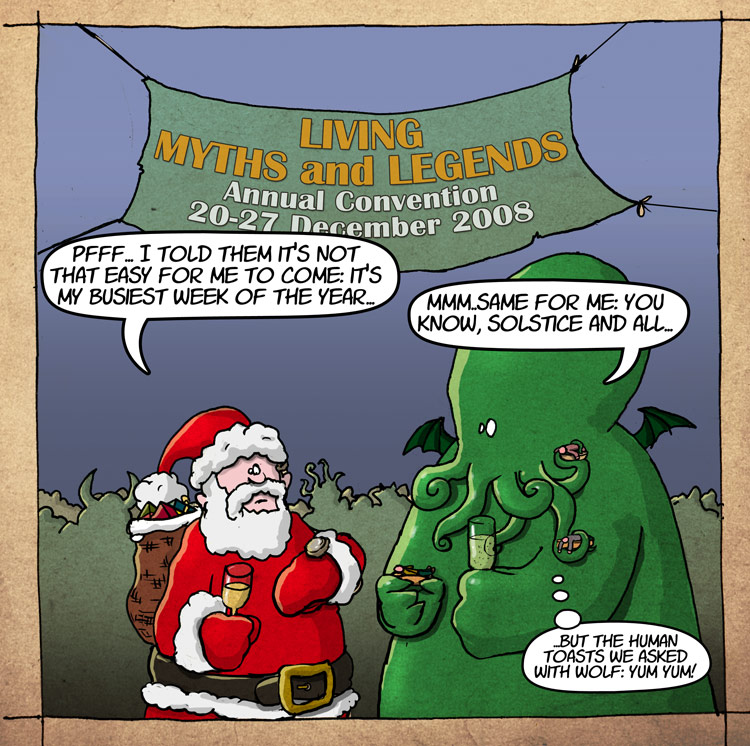What does it mean: "...but the human toasts we asked with wolf."

What does it mean: "...but the human toasts we asked with wolf."

Семь бед, один Reset
It's a morbid joke - referring to the green monster eating some humans.
BUT I think there is a typo (writing mistake) with the word "asked". It does not fit with the sentence. It should probably have been "had" or "exchanged".
Human = человеческий
Toast = тост
wolf = волк
Yum, yum = "sound that someone might make if they are eating something tasty, (that tastes good)
If you look closely at the picture, you can see that the green monster has some humans (people) In its tentacles....







It's Cthulhu.
I don't get what it has to do with Wolf, though.. Or is it random? wanja, help!
Вот это самое "with wolf" меня и интересует. Потому что никакого волка у них там нет...
Семь бед, один Reset
It could be that Cthulhu means he asked for human snacks with a wolf topping. But then having a wolf drawn in would have helped.
Спасибо за исправления!
Вам нравится этот форум, и вы изучаете немецкий язык? Вот похожий форум о немецком языке.
is this from a comic strip or some sort of series? It sounds like he asked wolf to toast with humans, that is, eat humans as a toast instead of drinking champagne.
Кому - нары, кому - Канары.

I think that Wolf here refers to the fairly tale monster from "Little Riding Hood" or a similar tale. Cthulhu probably regards him as a soulmate. Human toasts = toasts with humans on top, just as there are buttered toasts, toasts with cheese, etc.
Last edited by translationsnmru; December 31st, 2010 at 05:50 PM. Reason: The typo monster hits again! AAAAAAAA!
Ah! "toast" as in "toasted bread"! That's probably right.
But I think that toast as in "toasted bread" is not usually put into plural... While toasts in the context of drinking, is. That's probably why nobody got it - plus the characters are holding glasses. It sounds a bit strange to say it that way.. That sentence is a bit OFF somehow.. Frankly, it confuses me too - probably because it came out wrong.
But I think you cracked it!
Also, the usage of Wolf here is probably interesting from the perspective of a Russian speaker, because it plays with the usage of definite article, "the" in a way that is not completely clear at first (because everyone gets distracted by the strangeness of the sentence). I think it's exactly as translationsnmru says; This is referring to a specific wolf, known as "Wolf". For that reason "the" is not needed.

I think it is normally uncountable in the UK, where people speak of slices or pieces of toast, but in the US, it can be countable. E.g. the very first definition in the Merriam-Webster's Unabridged Dictionary says:
1 a : a slice or piece of toasted bread
used in the phrase as warm as a toast
Notice that "a" before "toast".
Longman, on the other hand, contains a definition for the phrase "warm as _toast" (no article).







ha ha, I got the part about toasts, because, frankly, I did not know that it's supposed to be called "toasted bread". We call them "toasts" in Russian, and Cthulhu does hold them in his tentacles.
I still think that it's a little strange that he speaks of some Wolf out of the blue, because there are no Wolves in Cthulhu universe.
So.. you say that it was not written by a native speaker?
Toast needs a counter, slice or piece. I've never heard of "warm as a toast" if toast is meant as toasted bread. "Human toasts" don't exist but the concept would be expressed by something like "slices of toast with humans on top." Even if we were to accept "human toasts," the expression "asked with" doesn't make sense." You could say "the slices of human toast we asked for with wolf." It would help if the OP cited the source, if this is written by a non-native speaker then there's no point in even trying to make sense of it.
Кому - нары, кому - Канары.

Thanks, Sperk. That definition in M.-W's actually lead me to believe that "a toast" was an acceptable American usage. Apparently, not.
And I do believe that the text was written by a non-native speaker.
As an American English native speaker, this cartoon made no sense to me, either. I asked my son, a Cthulu fan, if I were missing something. He says the cartoon is from this website:FAQ, in the archives as #277, and that the web designer is French.
My best guess is that translationsnmru is correct, that Wolf had provided the human toast hors d’oeuvres. I think the sentence should read:
"But the human toasts we asked OF Wolf, yum, yum." or (slangier), "But the human toasts we asked Wolf FOR, yum, yum."
At least, in English, we barely have to worry about cases after prepositions, but they still can be confusing...
Correct my Russian, please! Пожалуйста, исправьте мои ошибки!
Помогите мирy oдним щелчком ! Help the world with one click!
http://www.thehungersite.com/clickTo...s_home_sitenav
Russian Lessons | Russian Tests and Quizzes | Russian Vocabulary |